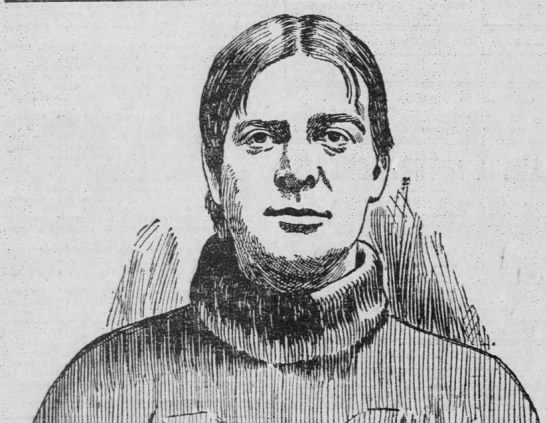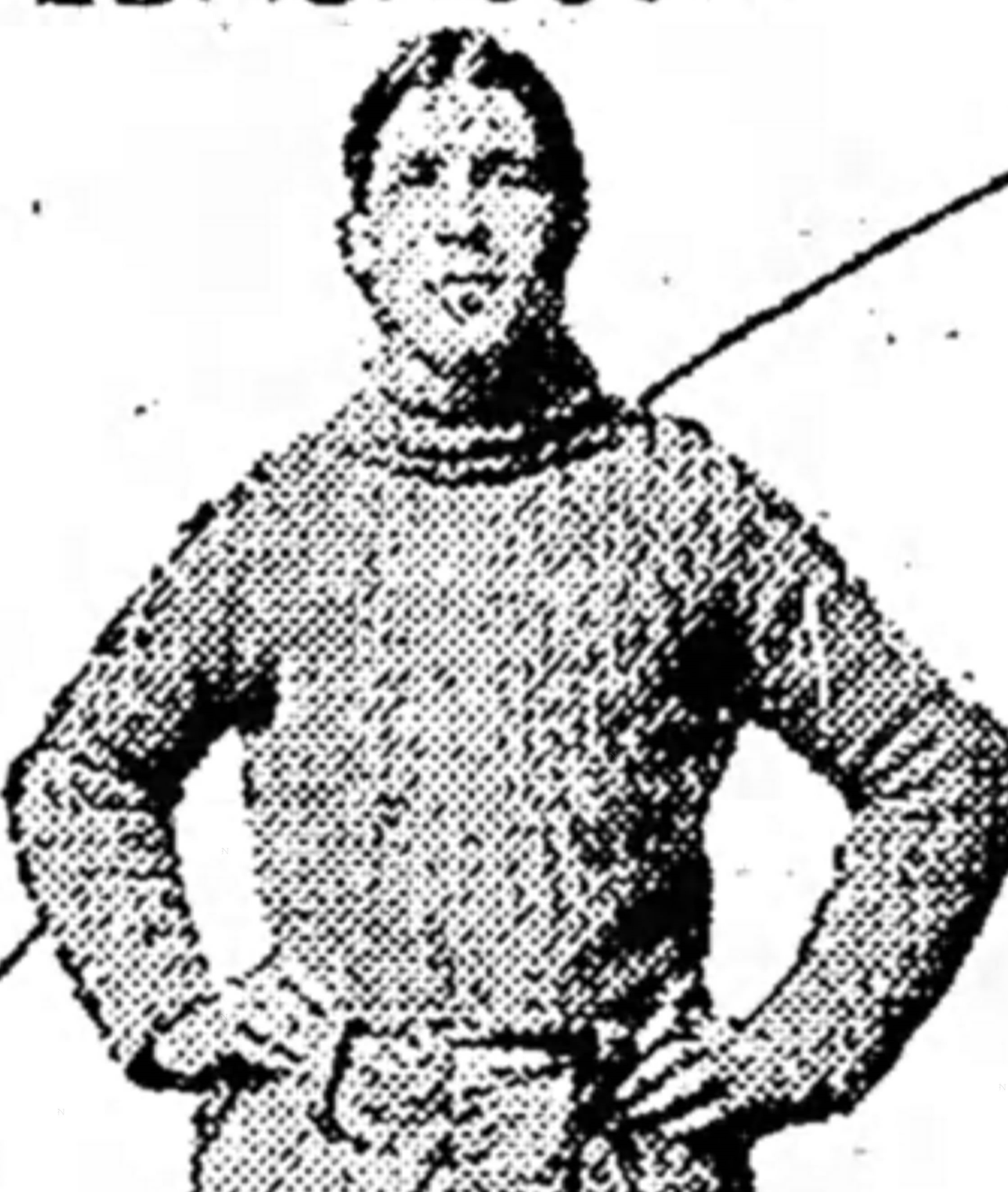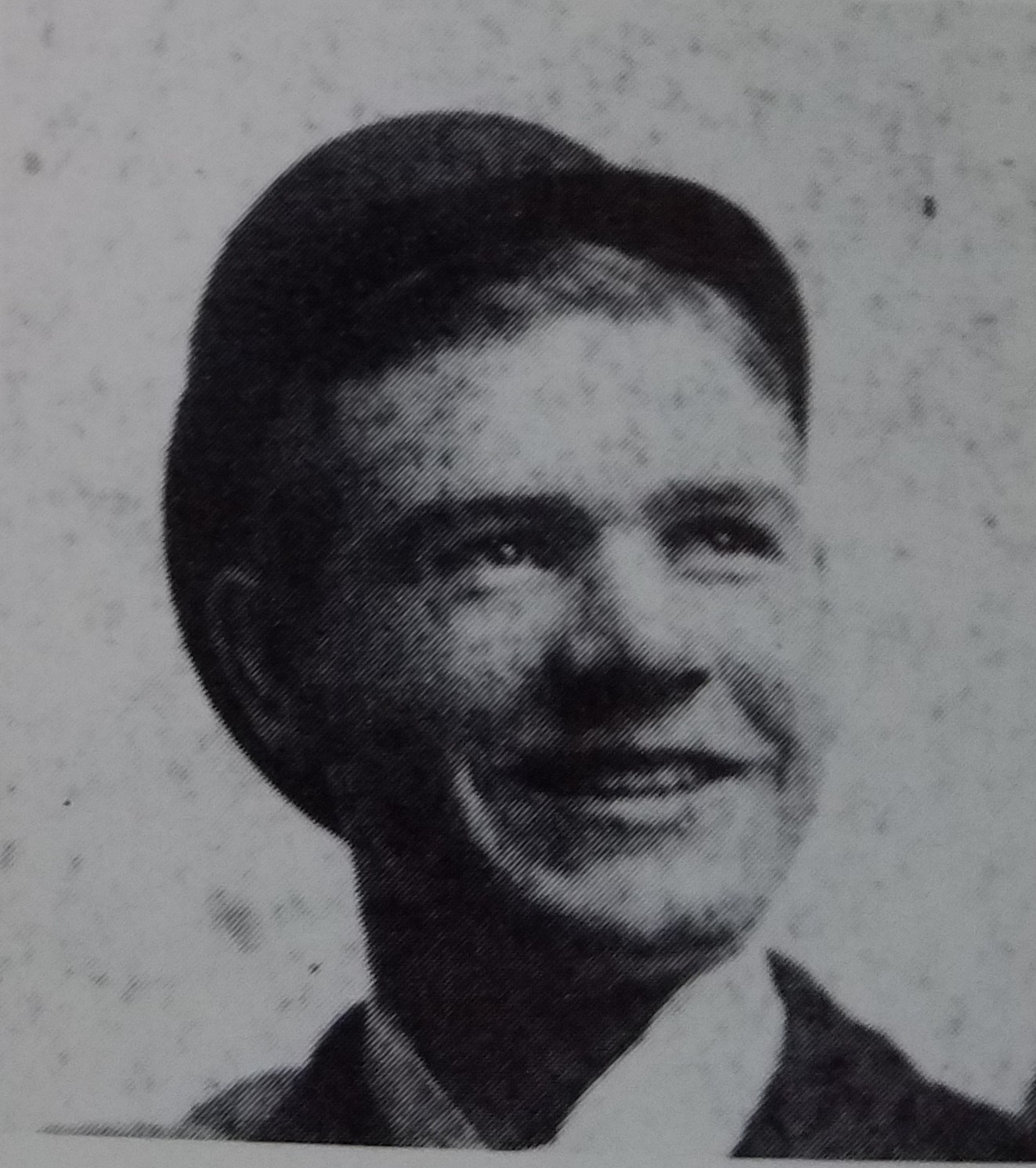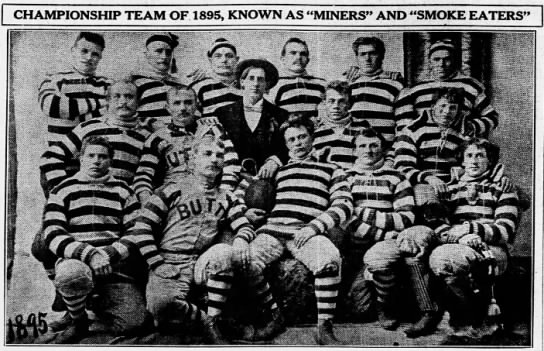|
With restrictions placed on the management of the 1894 Pastime
team, it was decided to withdraw from the Pastime
Athletic Club. The group reorganized as the Butte Football
Club and DeGay Stivers was elected Manager for the 1895 year.
Francis Brooks captain, Morris A. Davis treasurer, and Jim Hooper
coach. Butte recruited some of the best players available including
Jim Hooper (Michigan 1893), George King (University of California
1891-92), Donald Gillis (Michigan 1891-92), Francis Brooks
(Cambridge 1892), Morris Davis (Illinois) and Charles Blackburn
(Ogden Military Academy).
The opening game of the 1895 spring session against
Spokane was the hardest
hitting game played with several new players on the team.
Ellis, Weiss and Richards proved invaluable.
The young men from Salt Lake were shown the advantage of training
and conditioning as they were run ragged by the Butte squad in the
week two game. The trophy banners and $50 gold medal put up as a
trophy by buisnessman Joe Klaffki was safely remaining in Butte. Umpire of
the game was Mr. Lyon, former VP of the
Seattle Athletic Club.
The Buttes and
4,000 followers, got their return game with Omaha YMCA and revenge for
the disastrous physical beating they took the previous year in a
46-4 loss as the Pastime Club. With that win, the Butte squad sent out letters to all
challengers that they held the "championship" of the West and dared
anyone from Tacoma, Portland, Denver, Seattle or San Francisco to
come take it. Not to be outdone by Joe Klaffki, J.H. Leyson, Butte watchmaker and jeweler, put a
Gold Medal on the line in the challenge to the
Multnomah Club Winged M's. The Butte's showed their power
in an 18-6 win over the monsters from Portland.
*** $250 Gold Medal furnished by J.H. Leyson:
Description: The emblem is surmounted by two heavy gold bars
which bear the names of the opposing teams in large raised letters.
Underneath is a large eagle to which the pendant is attached by
substantial gold chains. The pendant is circular in form and about 2
inches in diameter, and is exceedingly rich and handsome. Two
figures are shown struggling for the ball on a field of green gold,
and the positions are wonderfully lifelike. One of the players is
tackling the other and the play has much the appearance of Donald
Gillis tackling Long-Haired Wilie Gardner of Omaha. A bright
gold fence appears against the background, which is of red gold. The
pendant is surrounded by a wreath of victory, and is finished off
with neat scroll work underneath.
The legendary Glenn "Pop" Warner played against the Buttes and
lost his shirt along with the $80 wager he placed on his Iowa team
coming away victorious in 1895. He met his match in
Big Jim Hooper as the two squared off
in the trenches.
Butte made a name for itself going 12-3 with Reliance of
California being their biggest nemesis of the 1895 season as they
laid claim to the Best football team in the Northwest region.
George W. McMillan played so well for Reliance during the Butte
battles of 1895, Charles Clark made a point of acquiring his
services and for the 1896 and 1897 seasons played and served as a
manager before building the Anaconda team until July 3, 1898 when he
retunred to Portland where he became known as the "football king" as
a member of the Multnomah Winged M's from 1898 to 1908.
The "second-season" of the fall and winter they did just that with
games against some of the best in the country. Reliance,
Olympic, Seattle and college teams from Iowa, Portland and Nebraska.
15 players traveled to San Francisco for the Christmas battle with
the Olympics. Following the games with the Olympics, a feud
simmered as to charges of "professionalism" because of two
players on the Butte squad (Hall and Laswell). The Pacific
Northwest Amatuer Association, siding with the Olympic Club was
withholding gate proceeds from the New Years Day game. Butte
threatened to sue. Olympic later pulled out of the Amateur
Association almost killing its ability to play football since the
big universities would not play a "professional" team. Butte
would get it's amatuer status reinstated by the PAA, but not until
the Vancouver game was canceled
and the team returned to Butte.
Billy Laswell, having showed his skills as a player for
Multnomah in the 1895 game and one of the fastest players in the
region, was recruited away to the "Copper Kings" and was named
the top player in the Northwest Region as a fullback, punter, and
kicker. He would play the 1897 season, but eventually came
down with pneumonia in 1900 and died at the age of 27 as did fellow
teammate Henry Brahm that same year.
Following the 1896 season it was discussed to no longer play
football all year 'round and instead focus on a fall/winter
campaign.
Millionaire Charles Clark pulled his funding after bankrolling the
1894 and 1895 seasons as well as providing well paying jobs in the
mines for such stars as George McMillian (Reliant), Big Jim Hooper
and George Dygert of Michigan. This led to difficulty securing
the guarantee funds needed to bring quality teams to Butte and some
schedule changes due to "political issues of the day". Those
issues came mainly in the form of "militia men" and "scabs"
associated with recent mining strikes. Union men were also
barred as beliefs that "retributions" could mar the games.
Teams rostering those men were not welcome in Butte and was a prime
reason for not playing Leadville, Colorado. The Leadville
incident involved the killing of a firefighter trying to extinguish
a mine fire started by union strikers.
Also at odds for the Butte squad, was a stripping of their amateur
status which was finally reinstated in October of 1897. The
"stripping" Butte claimed, was the Pacific Amateur Association
flexing as it refused to pay Butte it's portion ($455) from the
January games with Olympic Club of San Francisco, where the PAA is
based. This also led to a scaled back 3-game season in 1897, but
fueled the 1898 Anaconda feud and
subsequent battles. The opening of the
Butte Business College and formation of the football team in
1897 had coach Percy Benson pulling double-duty as coach for both
teams in helping get the squad off the ground.
1899 saw enough numbers for two teams to be formed in Butte, so Jim
Hooper and Percy Benson each formed a team. These were some of
the heaviest teams ever put together and injuries took a huge toll.
The final game was to pit the Hoopers and Bensons against one
another with fill-ins from Anaconda, however weather and the
financial failings of the season made for a decision to disband.
High School and Collegiate football were starting to take off and
the crowds and interest of old were waning.
D. McKinnon, starting left end for the 1898 team would make his
way to the Spokane Athletic Club for the 1900 season.
In June of 1931, Pete Snelson wrote an in depth historical
retrospective of the beginnings of the Butte "Big Teams" starting in
1893 with interviews of former players, coaches, businessmen and
included rosters, game summaries, and stories. The first
expose was published in the Great Falls Tribune on June 7, 1931 and
was followed up with June 14 and June 21 articles. Photographs
and much more were included and used to help put this historical
archive together. Mr. Snelson passed away in 1946 at the age
of 68, but it was through his writing the story of the Butte teams,
that those details were not lost forever. We need more Pete
Snelson's.
George McMillan, former halback
and manager in 1896 went on to a long career in Portland and was
inducted into the GNFA Hall of Fame in 2011.
"Big" Jim Hooper was elected to the
GNFA Hall of Fame in 2018.
DO YOU HAVE INFORMATION TO CONTRIBUTE?
CONTACT US! (email)
|
|

Greater Northwest Hall of Fame
tackle James Hooper

Greater Northwest Hall of Famer George McMillan
1895 Players included:
Charley Hooper (C), Weiss (G), Bob
Ellis (T), Chet Smith (E), Jim Hooper (G), Will Slater (T),
George W. King (E), Charles Blackburn (QB), Donald Gillis
(HB), Francis Brooks (HB), Tom Bowie (FB), Wilbur Boyce (T),
Calkins (G), Griffith (E), Richards (T), J. Jones, Morris
Allard Davis (QB), DeGay Stivers (QB), George B. Dygert (HB)
1896 Players included
McKinley, R. Alvin Weiss, Hugh
Perham (G), Ellis (T), Ed Perham, McPherson (E), Bird,
Sullivan, A. Perham, Wright, Henry Brahm (C), Bryans,
Parrott (G), DeGay Stivers (QB), Jim Hooper (T), R. Perham,
Slater (T), Jones (G), "Mickey" Harrington (FB), Percy
Benson (QB), George McMillan (HB), George Dygert (HB), Billy
Laswell (FB), Cloughly, Lydal, Maxwell, Wright, Hartsell
1897 Players included
Henry Braham (C), Parrott (G), Ellis (T), Slater (T), Jones
(G), George King (E), Langley (E), McPherson (E), Percy
Benson (QB), George Dygert (HB), Rickards (HB), Mickey
Harrington (FB), Bob Perham (E), Hugh Perham (G), Billy
Laswell (FB)
1898 Players included:
Henry Brahm (C), Comstock (G), Jim Hooper (G), Griffin (T),
Slater (T), Morris Davis (E), D. McKinnon (E), Brown (QB),
Bean (HB), Mahoney (HB), George Dygert (FB), LeBlanc (C), R.
Perham (E), Hugh Perham (G), Purcell (E), Percy Benson (QB),
MIckey Harrington (FB), McDonald, J. Sullivan, Adams,
Paustian |
1895
Indepedent
Record: 12-3
President: Charles W. Clark
Scribe: Bert Smith
Manager DeGay Stivers
Asst Mgr W. L. Armstrong
Coach Jim Hooper
* Northwest Independents
Champions *
1895 Awards
Jim Hooper (Tackle) Northwest
Player of the Year
1896
Indepedent
Record: 7-1
President: Charles W. Clark
Manager DeGay Stivers, George McMillan
Coach Jim Hooper
1896 Awards
Billy Laswell (FB/P/K) Greater
Northwest Player of the Year

Billy Laswell (FB/Punter/Kicker)
1897
Indepedent
Record: 3-0
Sponsor:
Manager DeGay Stivers
Coach Percy Benson
1898
Indepedent
Record: 2-2-2
Sponsor:
Manager DeGay Stivers
Coach Percy Benson
1899
Indepedent
Record: 1-1-1
Sponsor:
Manager DeGay Stivers
Coaches Percy Benson, Jim Hooper
1902
Indepedent
Record: 1-0
Sponsor:
Manager
Coach
|
|
Schedules and Results |
| Date |
Opponent |
Score |
| 1895 Apr 14 |
Spokane Athletic Club |
18-0 |
| 1895 May 29 |
Salt Lake City YMCA * |
52-0 |
| |
* Joe Flaffki Gold Medal Game |
|
| 1895 July 4 |
Omaha YMCA |
6-0 |
| 1895 Sep 2 |
Multnomah Athletic Club Winged M's* |
18-6 |
| |
*J.H. Leyson Gold Medal Game |
|
| 1895 Sep 15 |
Iowa State College |
12-10 |
| 1895 Oct 6 |
@ Anaconda Athletic Club Oxfords |
58-0 |
| 1895 Oct 16 |
University of Nebraska |
16-6 |
| 1895 Nov 13 |
Reliance Athletic Club (CA) |
6-8 |
| 1895 Nov 23 |
@ Denver Athletic Club |
6-12 |
| 1895 Nov 28 |
Olympic Club (CA) |
24-0 |
| 1895 Dec 1 |
Olympic Club (CA) |
12-6 |
| 1895 Dec 21 |
@ Reliance Athletic Club (CA) |
4-10 |
| 1895 Dec 25 |
@ Olympic Club (CA) |
14-12 |
| 1896 Jan 1 |
@ Portland University |
26-4 |
| 1896 Jan 4 |
@ Seattle Athletic Club (Championship) |
6-2 |
| |
|
|
| |
|
|
| 1896 May 15 |
Fort Douglas |
Cancel |
| 1896 May 30 |
All-Portland Team |
Cancel |
| 1896 June 11 |
Omaha YMCA |
20-0 |
| 1896 June 13 |
Doane College (Nebraska) |
22-0 |
| 1896 Aug 9 |
All-Nebraska Team |
10-0 |
| 1896 Oct 4 |
Port Townsend Athletic Club |
Cancel |
| 1896 Nov 7 |
@ Denver Athletic Club |
20-0 |
| 1896 Nov 12 |
@ University of Nebraska |
26-6 |
| 1896 Nov 14 |
@ Iowa Agriculture School |
Cancel |
| 1896 Nov 22 |
Iowa Agriculture School |
32-6 |
| 1896 Nov 26 |
Reliance Athletic Club (CA) |
Cancel |
| 1896 Nov 29 |
Reliance Athletic Club (CA) |
Cancel |
| 1896 Dec 25 |
@ Olympic Club (CA) |
18-0 |
| 1897 Jan 1 |
@ Olympic Club (CA) |
4-24 |
| 1897 Jan 5 |
@ Vancouver Barracks (WA) |
Cancel |
| |
|
|
| |
|
|
| 1897 Nov 21 |
@ Anaconda Anodes |
26-0 |
| 1897 Nov 25 |
Reliance Athletic Club (CA) |
6-4 |
| 1897 Nov 28 |
Reliance Athletic Club (CA) |
4-0 |
| |
|
|
| |
|
|
| 1898 May 30 |
Anaconda Anodes |
8-4 |
| 1898 June 13 |
Anaconda Anodes |
4-4 |
| 1898 July 3 |
Anaconda Anodes |
0-10 |
| 1898 Oct 16 |
Deadwood Club (South Dakota) |
5-5 |
| 1898 Oct 23 |
Deadwood Club (South Dakota) |
23-0 |
| 1898 Nov 24 |
@ Anaconda Anodes |
5-6 |
| |
|
|
| |
|
|
| 1899 Oct 15 |
Hooper's vs Anaconda |
7-6 |
| 1899 Oct 22 |
Benson's vs Anaconda |
5-10 |
| 1899 Nov 5 |
Hooper's vs Anaconda |
0-0 |
| 1899 Nov 25 |
Hooper's vs Benson's
(Weather) |
Cancel |
| |
|
|
| |
|
|
| 1902 Sep 28 |
Anaconda Anodes |
48-0 |
| |
|
|
| |
|
|
| |
|
|
| |
|
|
| |
|
|
| |
|
|
| |
|
|
| |
|
|
| |
|
|
| |
|
|
| |
|
|
| |
|
|
| |
|
|
| |
|
|
| |
|
|
| |
|
|
| |
|
|
| |
|
|
| |
|
|
| |
|
|
| |
|
|
| |
|
|
| |
|
|
| |
|
|
| |
|
|
| |
|
|
| |
|
|
| |
|
|
| |
|
|
| |
|
|
| |
|
|
| |
|
|
| |
|
|
| |
|
|
| |
|
|
| |
|
|
| |
|
|
| |
|
|
| |
|
|
| |
|
|
| |
|
|
| |
|
|
| |
|
|
| |
|
|
| |
|
|
| |
|
|
| |
|
|
| |
|
|
| |
|
|
| |
|
|
| |
|
|
| |
|
|
| |
|
|
|
|






